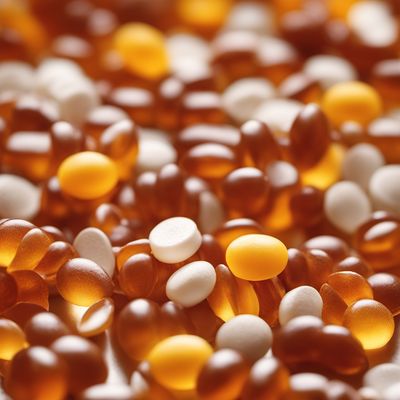
Ingredient
Vitamin D (cholecalciferol, ergocalciferol)
"The Sunshine Vitamin: Unlocking the Power of Vitamin D"
Vitamin D, also known as the "sunshine vitamin," is a fat-soluble vitamin that can be obtained through exposure to sunlight or consumed through certain foods and supplements. It exists in two forms: cholecalciferol (vitamin D3) and ergocalciferol (vitamin D2). Vitamin D is essential for the absorption of calcium and phosphorus, promoting healthy bone development and preventing conditions like rickets and osteoporosis. It also plays a crucial role in supporting the immune system, regulating mood, and reducing the risk of chronic diseases such as heart disease, diabetes, and certain types of cancer. Vitamin D is unique as it can be synthesized by the body when the skin is exposed to sunlight, making it both a nutrient and a hormone. However, due to limited sun exposure and dietary preferences, many individuals may not obtain adequate amounts of vitamin D, making supplementation or dietary sources crucial for maintaining optimal levels.
Origins and history
The discovery of vitamin D dates back to the early 20th century when scientists were investigating the causes of rickets, a bone disease prevalent in children. It was found that exposure to sunlight or consuming foods like cod liver oil could prevent and treat rickets. The identification of cholecalciferol (vitamin D3) and ergocalciferol (vitamin D2) as the active forms of vitamin D furthered our understanding of its importance. Throughout history, cultures around the world have recognized the significance of sunlight in maintaining health, with ancient civilizations like the Egyptians and Greeks using sunlight exposure as a remedy for various ailments. Today, vitamin D deficiency is a global health concern, leading to increased awareness and supplementation efforts.
Nutritional information
Vitamin D is essential for calcium absorption, bone health, and immune function. It is also involved in regulating mood and reducing the risk of chronic diseases. The recommended daily intake of vitamin D varies depending on age, sex, and life stage, but generally ranges from 400 to 800 international units (IU) per day.
Allergens
Vitamin D itself is not associated with any known allergens.
How to select
When purchasing vitamin D supplements, it is important to choose reputable brands that adhere to quality standards and have undergone third-party testing for purity and potency. Look for supplements that contain cholecalciferol (vitamin D3) or ergocalciferol (vitamin D2) and check the expiration date to ensure freshness.
Storage recommendations
Store vitamin D supplements in a cool, dry place away from direct sunlight. Follow the storage instructions provided on the packaging to maintain the potency and effectiveness of the supplement.
How to produce
Vitamin D cannot be produced by individuals at home as it requires exposure to sunlight or specialized manufacturing processes to obtain cholecalciferol (vitamin D3) or ergocalciferol (vitamin D2).
Preparation tips
Vitamin D supplements are typically taken orally and can be consumed with or without food. It is important to follow the recommended dosage provided by healthcare professionals or the instructions on the supplement packaging. To enhance absorption, it is advisable to take vitamin D supplements with a source of dietary fat, such as a meal containing healthy fats. Additionally, incorporating vitamin D-rich foods into your diet, such as fatty fish (salmon, mackerel), fortified dairy products, and egg yolks, can help meet your daily requirements.
Culinary uses
Vitamin D, in the form of cholecalciferol (vitamin D3), is commonly added to foods such as milk, yogurt, and breakfast cereals to fortify them with this essential nutrient. It is also found naturally in fatty fish like salmon and mackerel, as well as in egg yolks. Incorporating these foods into your diet can help increase your vitamin D intake.
Availability
Vitamin D supplements and fortified foods are widely available in most regions and countries. Natural food sources of vitamin D, such as fatty fish and egg yolks, can be found in grocery stores and supermarkets.
More ingredients from this category » Browse all

Vitamin B12 (cyanocobalamin, hydroxocobalamin, methylcobalamin)
The Essential Vitamin: Unveiling the Power of B12

Vitamin B6 (pyridoxine, pyridoxamine, pyridoxal)
The Essential Nutrient Trio: Unveiling the Powers of Vitamin B6

Vitamin A (retinol, carotenoids)
The Vision Booster

Vitamin B9 (folic acid, folinic acid)
The Essential Nutrient for Cell Growth and Development

Vitamin B5 (pantothenic acid)
The Essential Nutrient: Unveiling the Power of Vitamin B5

Vitamin B2 (riboflavin)
The Radiant Nutrient

Vitamin E (tocopherols, tocotrienols)
The Antioxidant Powerhouse

Vitamin B7 (biotin)
The Beauty Vitamin: Unveiling the Wonders of Biotin

Vitamin K (phylloquinone, menaquinones)
The Mighty Nutrient: Unveiling the Power of Vitamin K

Vitamin C (ascorbic acid)
The Immunity Booster: Unveiling the Power of Vitamin C

Vitamin B3 (niacin, niacinamide)
The Essential Nutrient: Unveiling the Power of Vitamin B3

Vitamin B1 (thiamine)
The Essential Energy Booster